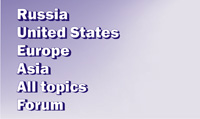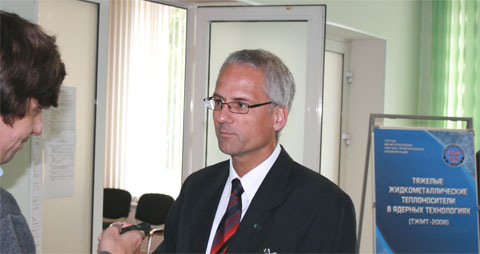


Articles
National flag of Russian Federation hoisted on Yakutia nuclear icebreaker
Reactor pressure vessel of Xudapu NPP Unit 4 has been installed in design position
China offers the world a solution through nuclear technology applications
Alexey Likhachev attended the launching ceremony of Chukotka nuclear icebreaker
Rosatom manufactures first nuclear fuel for a research reactor in Bolivia
Press Releases
34th Rossing Marathon held in Namibian Swakopmund
Rosatom to Co-host The Arctic - A Territory of Dialogue International Arctic Forum

Joachim Knebel: safety is always one of most important issues

Dr.-Ing. Joachim U. Knebel, head of Program Nuclear Safety Research, Forschungszentrum Karlsruhe (Germany), vice-president of European Nuclear Society (ENS).
Please what is your opinion about HLMC-2008 conference in Obninsk, Russia?
I think it is very important conference in the field of the liquid metal technology. It gives very well overview on what is done worldwide in this field, especially in Russia, which is the leading nation in the liquid metal technology (lead and lead-bismuth).
In the conference we see the presentations on all research works in Russia, starting 50 years ago. Initially, it was the submarine application and now it is starting to be the civilian application. It is done in parallel to the light-water reactors and sodium reactors just in order to find the solutions for the energy problems.
This conference gives the very good overview of the work in Russia. Of course, I would like to stress we can see also the works done in international collaboration with Europe, Japan and USA.
You present here the overview of your research work which is done in the Karlsruhe center. Please introduce it for our readers.
I am coordinator of the biggest EURATOM project, which deals with the transmutation of the high-level waste. We are studying the heavy-liquid metal cooled subcritical accelerator-driven system. The results of this 5-year project would be the conceptual design of such system.
We concentrate on the technologies - material development, corrosion problems… We deal with the thermal hydraulics. We look at all the safety aspects of these machines. We work to do the lead-bismuth cooled machines as safe as possible.
Other important issue is to study the transmutation potential of our machine - how can we operate such transmutation system to get rid off the waste? We suppose it should be operated in the clever way, in the closed fuel cycle. It brings our work in relation to this conference again.
Of course, the safety is always one of the most important issues. You have to design any nuclear machine in the safest way as possible. Here the Russian scientists also care to deal safely with the radioactive wastes, plutonium and minor actinides.
Is you work connecting to the Generation-IV project?
This is independent technological aspect, on which we are concentrating in Germany. Our work is related to safety and technology of the subcritical machines and then, of course, on its transmutation potential.
What is your personal opinion - can the German government to reconsider the decision to cancel the nuclear power engineering?
This is very difficult political question, and it is really up to political persons. I can say only that we, scientists, have the job to look in the safety of nuclear reactors. We look at the safety of waste disposal in the deep geological repositories or possibility to transmute it in order to reduce the radiotoxicity.
So, that is our task. We shall provide the best results for politicians and for industry in order to give them the necessary background for decision-making.
Thank you for the interview for AtomInfo.Ru web-edition, which was given during the HLMC-2008 conference in Obninsk, Russia.
SOURCE: AtomInfo.Ru
DATE: September 28, 2008
Topics: Spent Fuel, Russia, Germany, Lead-Bismuth